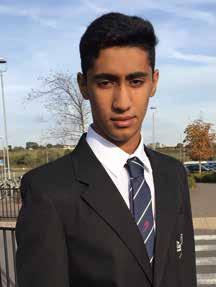
4 minute read
Asif, Sanctuary Scholar
Asif had never attended school before he fled the Taliban aged only 14. Five years later, he is studying History and Economics as Somerville’s newest Sanctuary Scholar. Asif shares his exceptional story, and how he realised that education is the most important thing of all.
Advertisement
You might think that leaving my home as an unaccompanied child refugee, or spending nights in a cold Bulgarian prison, or living in Calais’ ‘Jungle’ camp would be the parts of my life that have shaped me the most - but it’s my desire to learn that really drives me. I grew up in a village in the south-eastern Nangarhar region of Afghanistan with very little access to education except in reading Quranic Arabic. Children in the village often worked, especially at harvest time, but otherwise there wasn’t much for us to do. It wasn’t enough for me; I knew that I wanted to learn more, to read, to write. I had no idea how my wish would be granted. In May 2016, my life changed forever. The Taliban were returning to the area after years in exile in Pakistan, and they were conscripting men and boys as fighters. At the age of 14, I was unlikely to be spared. My family was faced with an unthinkable choice: hand me over to violent fundamentalists, or entrust me to people smugglers and send me to seek sanctuary abroad? So I left, alone, and with no idea of where I was going. It was the last time I saw and spoke to my parents.

Reaching the UK took five long, terrible months. People traffickers have no mercy in them at all. You had to do what they said without question, and we were told as little as possible at every stage. It was no better without them; some countries would imprison us, only to release us on the border and send us off to repeat the process in the next destination. The worst were the prisons in Bulgaria and Serbia, where we were given only one small meal per day. In August I reached Calais, where I lived in the infamous ‘jungle’ camp in its final months before demolition by the French government. Sometimes I slept in a shipping container bunkbed, sometimes in a tent. The camp housed thousands of people, and conditions were crowded and filthy. After two months, I was smuggled to the UK hidden in a lorry. Once again, I didn’t really know where I was being taken or if I was safe.
After a night in a children’s detention centre, I was placed in a care home for two weeks before being fostered in Thurrock, just to the east of London. It was surreal that my journey was at an end. I was finally safe, but Thurrock was not at all like home. In my village, I knew every family (of which there were around 300), but now I barely knew who the neighbours were. I miss that sense of support and community. Nevertheless, I was so fortunate to be there. I quickly realised that I had also been extremely lucky with my foster placement. Right from the start, my foster mum really cared about me and my future. She fought for me to start school a year behind to give me a chance to catch up with my English, and it’s unlikely I would be here at Somerville without that. The support she gave me was just phenomenal, and we are still close now.
I never imagined I’d get into Oxford - I wasn’t sure if I would apply to University at all. After all, I am a refugee who started school aged 14 and went through the care system. And how would I ever afford to study? My asylum application was denied (I was granted five years of Leave to Remain while appealing), so I was unlikely to qualify for student finance or home fee status. And which college would I fit in and be included at, given my background? The two questions had the same answer. One of my heroes, Lord Alf Dubs, was speaking at an online event I watched, hosted by Somerville’s Principal Jan Royall. I was intrigued, and the more I read about the college, their support for refugees and their commitment to including the excluded, the more I knew I’d found the right place. I can’t describe the feeling when I got the news about the Sanctuary Scholarship. I simply would not be able to be here without it, and I cannot thank Somerville and the University enough.
My experience at Oxford so far has been wonderful. I’m studying History and Economics here because I want to be able to create positive change. I’m passionately interested in development economics, learning how countries grow and how the world is moving. I’m finding that the more I learn, the more I want to learn! I want to work for a non-profit once I’ve finished my education, hopefully back in Afghanistan. I know that my parents, wherever they are, are proud of everything I’ve achieved. It always come back to education. Education breaks the cycle of poverty and violence, and it transforms economies and societies. There is so much you can do, if you have access to the opportunity to learn. I am really looking forward to these next few years… these next few decades come to think of it!











